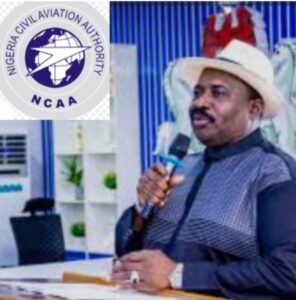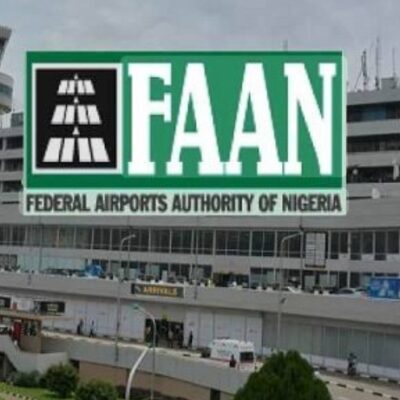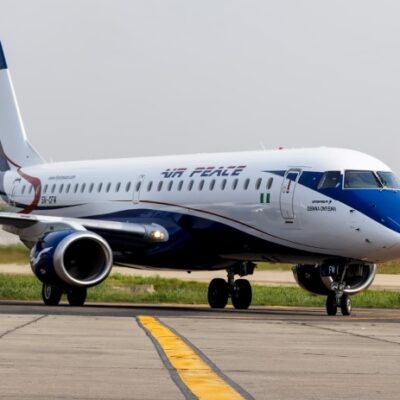
BY OLAPEJU OLUBI
The Nigeria Civil Aviation Authority (NCAA) has strongly refuted claims by Senator Orji Uzor Kalu suggesting alleged lapses in pilot preparation, substance abuse among flight crews, and weaknesses in the Authority’s oversight of aviation safety.
In a detailed response released this week, the NCAA emphasized that Nigeria’s aviation regulatory system remains robust, internationally recognized, and uncompromising on safety.
While acknowledging the Senator’s stature and the National Assembly’s role, NCAA Director General Capt. Chris Najomo said it was necessary to correct misconceptions that could undermine public confidence.
“Contrary to the impression created, the Nigeria Civil Aviation Authority maintains a rigorous and internationally recognized system for certifying and monitoring the medical and professional fitness of all pilots operating in Nigeria,” Najomo stated.
The NCAA explained that no pilot is permitted to operate a Nigerian-registered aircraft without a valid pilot licence and a current Class 1 Medical Certificate, in accordance with the Nigeria Civil Aviation Regulations (Nig. CARs).
“Medical certificates are issued only after comprehensive aero-medical evaluations by NCAA Authorized Aviation Medical Examiners, followed by internal approval from our in-house aero-medical assessors,” Najomo said.
These evaluations, he noted, cover cardiovascular, neurological, psychological, metabolic, respiratory, and visual assessments to ensure pilots are fully fit to operate aircraft safely.
Nig. CARs specifically prohibits any applicant from having a condition or disease that could suddenly incapacitate them while flying, and also screens for psychoactive substance use, mental disorders, and other physiological conditions that could compromise safety.
Pilots under 40 undergo annual medical tests, while those aged 40 and above are tested every six months before certificates are renewed.
Beyond certification, Nig. CARs Part 8.5.1.5 forbids any crew member from operating an aircraft within eight hours of consuming alcohol or while under the influence of drugs or psychoactive substances.
Random and unannounced substance testing is carried out by NCAA, with results admissible as legal evidence.
The Authority also conducts daily ramp inspections at airports nationwide, which involve direct engagement with flight crews.
Inspectors verify licenses, medical certificates, and general fitness for duty, addressing irregularities immediately.
As an example of enforcement, Najomo noted that in August 2025, the NCAA suspended a ValueJet pilot for initiating departure procedures without proper clearance — a clear demonstration of the Authority’s zero-tolerance policy for safety violations.
“Suggesting that pilots operate under the influence of substances or without adequate checks is inaccurate,” Najomo said. “Our processes are thorough and fully consistent with global standards set by the International Civil Aviation Organization (ICAO).
Nigeria has consistently met ICAO audit requirements under the Universal Safety Oversight Audit Programme, placing our country among those maintaining effective safety supervision systems.”
The NCAA also addressed misconceptions about modern aircraft automation. While many planes have autopilot and autoland systems, take-offs are entirely manual, and autopilot is only engaged after reaching safe altitude.
Landings within Nigeria are fully manual, as no airport is certified for Category III (CAT III) operations, which allow fully automatic landings under low-visibility conditions.
“Modern autopilot systems do not replace pilot control. All critical operations are executed by our highly trained crew,” Najomo emphasized.
The Authority reaffirmed its commitment to the safety and professionalism of Nigerian pilots, highlighting ongoing inspections, random substance testing, enforcement actions, and adherence to ICAO provisions.
“The safety of air transport operations in Nigeria remains paramount and uncompromised. We have never and will never tolerate any act that endangers public confidence in our aviation system,” Najomo said.
While acknowledging Senator Kalu’s concerns, the NCAA insisted that these claims did not reflect the factual state of regulatory practice in Nigeria.
The Authority reiterated its openness to constructive engagement with the National Assembly and all stakeholders to further strengthen the safety, security, integrity, and global reputation of Nigeria’s air transport industry.
“We welcome dialogue, but it must be based on facts. Nigerian aviation remains one of the safest in the region, and our pilots continue to operate at the highest standards,” Najomo concluded.
Olapeju is a journalist and aviation reporter.





